Dante at UCL Special Collections: celebrating his 750th anniversary
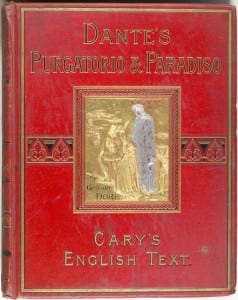
The Vision of Purgatory and Paradise by Dante Alighieri
The Italian poet Dante Alighieri was born 750 years ago, and UCL Special Collections has been playing a leading part in the international celebrations. Events elsewhere have been taking place throughout 2015, and include the issue of a commemorative 2-Euro coin – an interesting choice for a poet who condemned financial corruption – and a recitation of Dante’s poetry from space by Italy’s first female astronaut, transmitted to earth for broadcast in an Italian cinema. Here at UCL Special Collections, events have been more modest but, we hope, commensurate with the remarkable international significance of UCL’s history with Dante.
That significance began with the activities of a nineteenth-century Dante enthusiast, Henry Clark Barlow. His collection of editions of Dante forms the core of UCL’s Dante Collection. From among its 5,000-odd printed volumes dating from 1477 to the late 1900s you can, thanks to the work of the Retrospective Cataloguing Team, now read Dante’s masterpiece, the Divine Comedy, in any of a vast range of translations from English to Japanese, or experience the impact of its illustrations by artists from Botticelli to Dali and beyond.
With a copy of almost every edition printed before 1600, including three produced in the 1400s at the birth of the new technology of printing, it is possible to use this rare-book collection to trace the fierce battle, nearly 200 years after his death, to claim Dante and his language, resulting eventually in the use of Dante’s Florentine dialect as the chief source for what became modern Italian. Written in the early 1300s, the Divine Comedy was again at the centre of innovation in 1502 when it was one of the texts chosen to pioneer the small-format book, from which point onwards printed books tended to resemble the modern paperback in format. Later again, in the mid 1500s, French printers used Dante’s poem to popularise miniature books intended to capture the newly emerging market of female book-owners.
To return to Henry Clark Barlow, his archive, alongside his books, also forms part of the collection. It reveals how, travelling around Italy, he played a key role in persuading Florence, followed by other cities, to celebrate the 600th anniversary of Dante’s birth in 1865, issuing regular editions of a special newspaper for two years before the events to increase excitement, and writing home to describe banners, festive costumes and lengthy civic dinners. Remarkably, Barlow promoted this celebration of an Italian hero while the formation of modern Italy was still underway. A politically fascinating account of the implications of Barlow’s activities was published later in 1921, the year of another 600th anniversary, this time of Dante’s death, and just one year before Mussolini came to power.[1]
Great endeavours grew from Barlow’s activities, including plans for an Italian national edition of Dante’s work and the establishment of Dante-following organisations in Britain, but one wonderful outcome for UCL was Barlow’s bequest, in 1876, both of his books to the library and of some provision for Dante studies at UCL. While avoiding festive costumes and street banners, UCL Special Collections has for some years been involved, together with UCL Italian Department and the Warburg Institute, in weekly lunchtime readings and talks on selected passages from the Divine Comedy. The tradition of such public Dante events dates back to the time of the medieval poet Boccaccio but was fostered in the 1800s by Barlow. In the spirit of this tradition, our events began for students of both institutions, were soon on popular demand opened up to other members of the University of London and then to the public, and resulted last year in the astonishing and delicious achievement of one participant who cooked the entire poem, from Inferno to Paradise, in biscuit form.
For the 750th celebrations, we were generously supported by the Italian Cultural Institute, and organised, in collaboration with St. Giles-In-The-Fields church, four days of events in November including a discussion on ‘Why Dante?’, a day of readings and lectures on the Divine Comedy, a talk and exhibition of UCL Special Collections’ outstanding collection of early and rare editions of the poem, a church service exploring Dante’s influence on the development of Christian thought since the late Middle Ages, and a showing of a 1911 silent film, recently restored by Bologna Archives, of the first part of the Divine Comedy: the Inferno. Videos of the events are due to be made available online, and of course ephemera from this year’s celebrations will be added to UCL Special Collections to record UCL’s continued role in the celebration and study of Dante.
If you missed our 750th anniversary events and would like to find out more about Dante, try our weekly lunchtime readings and talks.
[1] Mary Bradford Whiting, ‘The Dante sexcentenary of 1865’ in Music & letters 1921 v.2 no.2 April pp. 172-182 or access via JSTOR
UCL Special Collections calendar
On TV
Both links above require a UCL login
Exhibitions

Rare printed books and archival material illustrating the numbers 1 to 9, with exhibits from the London Mathematical Society’s collections
Main Library, UCL Gower Street, London, until February 2016
A range of rare material, from medieval manuscripts to radio-active lab notes
Octagon Gallery, UCL Gower Street, London, until 31 January 2016
Fair Play and Foul: Connecting with Shakespeare at UCL
Main Library, UCL Gower Street, London, from February 2016
Five exhibits from recently catalogued material, including a micrographic illustration of Jerusalem
Main Library, UCL Gower Street, London, until December 2015
750 Years of Dante
A small selection of illustrated editions from UCL’s outstanding collection of rare editions of Dante’s Divine Comedy
Main Library, UCL Gower Street, London, from December 2015
Medical Treasures
Examples of the range of Special Collections’ medical material, from the first illustration of a leg amputation through Vesalius’ ground-breaking Renaissance anatomy textbook to more recent cartoons
UCL Cruciform Hub, Gower Street, London. Permanent.
What is paper? What is a book? What is the difference between a physical and an e-book? Student projects on the history of the book.
Research-based projects put together by students volunteering with UCL Special Collections, illustrating their tools, techniques, and thoughts on using rare books and archives alongside digitised and e books.
UCL Senate House Hub, 3rd floor Senate House, Malet Street, London, from January 2016
Dr. Tabitha Tuckett, Rare-Books Librarian
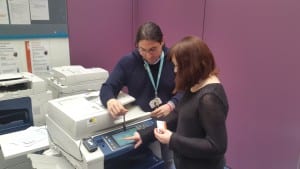 “I’m sorry to bother you” is not a phrase we in the Main and Science Help Team particularly relish hearing from students. Believe it, or not, the stereotypical image of the Librarian ensconced in an ivory tower, thumbing through The Collected Works of Proust, shushing anyone who dares to disrupt their solitary quest for enlightenment, still endures.
“I’m sorry to bother you” is not a phrase we in the Main and Science Help Team particularly relish hearing from students. Believe it, or not, the stereotypical image of the Librarian ensconced in an ivory tower, thumbing through The Collected Works of Proust, shushing anyone who dares to disrupt their solitary quest for enlightenment, still endures. Close
Close




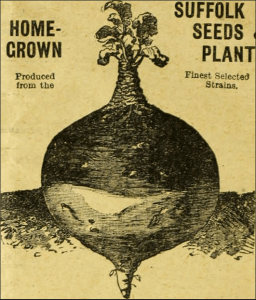
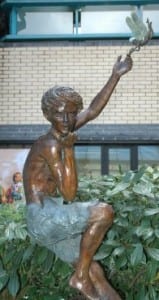
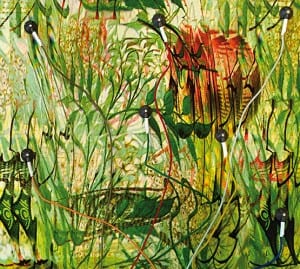
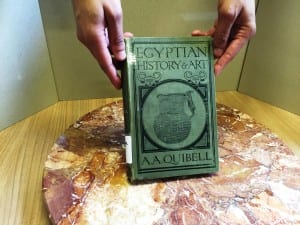 ‘Lazy Susan: Portable Toolkit’ is a stone sculpture which functions as an object handling desk. I am currently touring the sculpture to various archives and museums, to film a series of short (1-2 mins) object presentations by museum professionals.
‘Lazy Susan: Portable Toolkit’ is a stone sculpture which functions as an object handling desk. I am currently touring the sculpture to various archives and museums, to film a series of short (1-2 mins) object presentations by museum professionals. In early September this year I had the pleasure of opening a parcel containing a slim volume: a newly published book I had written under the title “Supporting research in area studies: a guide for academic libraries”. It was an attempt to capture some of what I had learned over many years at
In early September this year I had the pleasure of opening a parcel containing a slim volume: a newly published book I had written under the title “Supporting research in area studies: a guide for academic libraries”. It was an attempt to capture some of what I had learned over many years at 

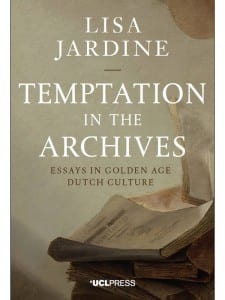
 Journals currently published by UCL Press include
Journals currently published by UCL Press include 
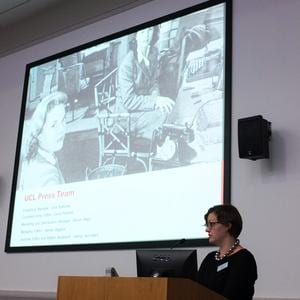 The UCL Press team had a busy and eventful Open Access Week presenting and attending a number of talks and events at other universities, and culminating in UCL’s own Open Access conference. With around 120 attendees it was the best attended UCL Open Access conference so far, and delegates came from numerous institutions and a wide range of backgrounds – librarians, funders, repository managers, academics, students and publishers were present.
The UCL Press team had a busy and eventful Open Access Week presenting and attending a number of talks and events at other universities, and culminating in UCL’s own Open Access conference. With around 120 attendees it was the best attended UCL Open Access conference so far, and delegates came from numerous institutions and a wide range of backgrounds – librarians, funders, repository managers, academics, students and publishers were present.